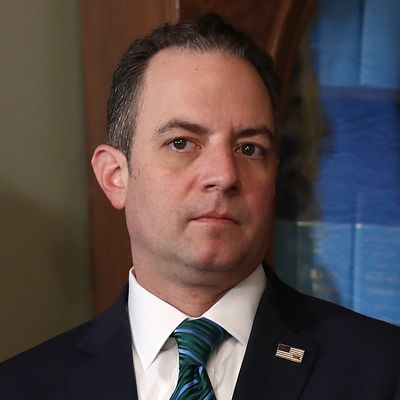
Last week, with the fallout over National Security Adviser Michael Flynn’s resignation drawing new attention to the Trump administration’s contact with Russia, the New York Times and CNN reported that Trump aides communicated with Russian intelligence officials throughout the campaign, according to U.S. officials.
Now CNN reports that the White House asked the FBI to say that the stories were untrue, and there had been no contact — a request that violates longstanding procedure memos that limit communications between the White House and the Justice Department about ongoing investigations. The FBI refused to publicly refute the reports because the investigation into communications between Trump associates and the Russians is ongoing.
Late on Thursday night, White House Press Secretary Sean Spicer disputed CNN’s characterization of the request, though he confirmed that the White House discussed the reports with FBI officials on February 15. “We didn’t try to knock the story down. We asked them to tell the truth,” Spicer said.
A U.S. law enforcement official said White House Chief of Staff Reince Priebus first raised the issue with FBI Deputy Director Andrew McCabe during an unrelated meeting at the White House a day after the stories were published.
An unnamed White House official told CNN that Priebus then reached out to McCabe and FBI Director James Comey. If they wouldn’t publicly refute the story, he wanted them to dismiss it in talks with reporters on background.
It’s unclear what McCabe told Preibus, but a law enforcement source said he did not discuss the case with the chief of staff. Comey refused to push back against the story as well, citing the ongoing investigation.
The White House claims that McCabe initiated the conversation with Priebus to express that they reports were overblown. “To be clear, it was the FBI that contacted the White House to rebut the New York Times’ story,” Spicer told Politico. “We merely asked them to inform journalists of the same point that they were making to us.”
Priebus refuted the story himself on the Sunday shows, calling it “complete garbage” on Face the Nation, and declaring, “I think that the media should stop with this unnamed source stuff.” On Fox News Sunday, he claimed that “top levels of the intelligence community” assured him that the reports were wrong:
The New York Times put out an article with no direct sources that said that the Trump campaign had constant contacts with Russian spies, basically, you know, some treasonous type of accusations. We have now all kinds of people looking into this. I can assure you and I have been approved to say this – that the top levels of the intelligence community have assured me that that story is not only inaccurate, but it’s grossly overstated and it was wrong. And there’s nothing to it.
When Chris Wallace pressed Priebus on who told him that, he refused to identify his source. Wallace pointed out that Priebus had just complained about the use of anonymous sources. “Well, because I didn’t ask for approval to use their name,” Priebus said. “But let me tell you when I say top-level people, I mean top-level people.”
Days earlier Preibus had also urged the FBI to anonymously leak to reporters, according to CNN, but the important revelation here isn’t that Preibus said something hypocritical on TV — it’s the claim that the Trump White House tried to persuade the FBI to refute a story for political purposes.
Justice Department procedure memos issued in 2007 and 2009 say that the FBI should only discuss pending investigations with the White House when it’s vital to the president’s duties. The 2009 memo says:
Initial communications between the [Justice] Department and the White House concerning pending or contemplated criminal investigations or cases will involve only the Attorney General or the Deputy Attorney General, from the side of the Department, and the Counsel to the President, the Principal Deputy Counsel to the President, the President, or the Vice President from the side of the White House.
For an explanation of why the White House shouldn’t communicate with the Justice Department about a pending investigations, just look at the reaction Trump and other Republicans had to Bill Clinton chatting with then–attorney general Loretta Lynch on a tarmac last summer as the FBI probed Hillary Clinton’s emails.
Trump suggested, with no proof, that Bill Clinton told Lynch that Hillary would keep her on as attorney general if she covered up the email investigation.
Republican Senator John Cornyn said of Clinton’s conversation with Lynch: “This incident does nothing to instill confidence in the American people that her department can fully and fairly conduct this investigation, and that’s why a special counsel is needed now more than ever.”
In recent days Cornyn has said Flynn’s resignation should be investigated by the House and Senate intelligence committees. That’s further than many of his Republican colleagues were willing to go, but far short of joining calls to appoint a special prosecutor to investigate the Trump team’s connection to Russia.
Attorney General Jeff Sessions is resisting Democratic calls to recuse himself from such investigations. In response to CNN’s report on Priebus’s FBI request, a Department of Justice spokesman said Sessions is reviewing the procedural memos and “the Department is following the guidelines in its communications with the White House.”
On Thursday night, Representative John Conyers, the ranking Democrat on the House Judiciary Committee, renewed his call for Sessions to recuse himself. “The need for an independent, bipartisan investigation into these matters has never been more clear,” he said. “The Trump team has clear ties to the Russian government — and we ignore those ties at our own peril.”






























